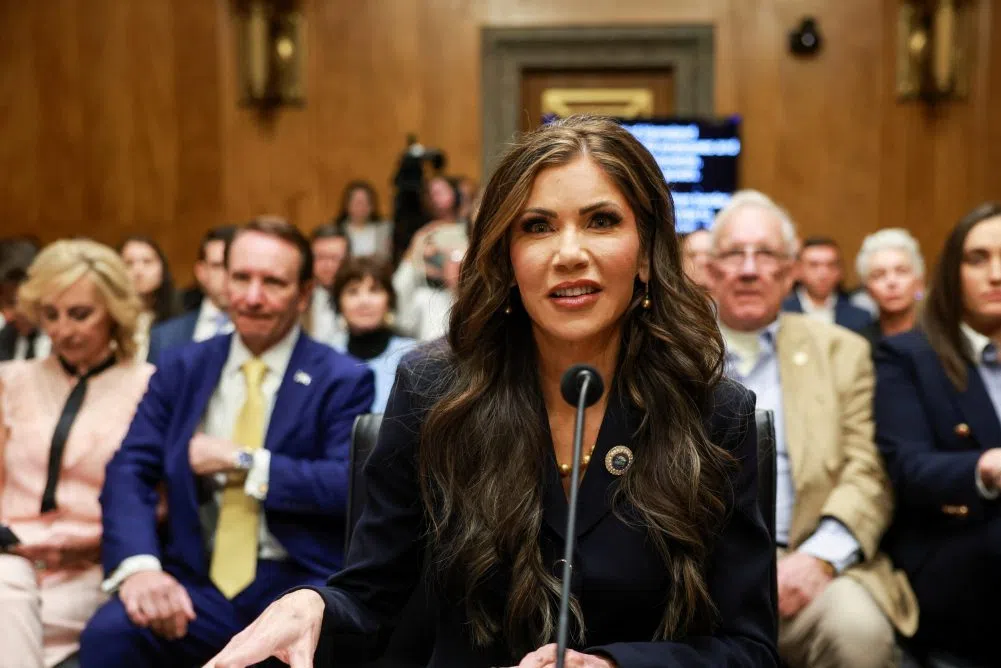WASHINGTON (Reuters) -President-elect Donald Trump’s planned immigration crackdown emerged as a top theme at a U.S. Senate confirmation hearing for South Dakota Governor Kristi Noem, his choice for secretary of Homeland Security and a Republican who mirrors his hardline views.
Noem, who would lead the 260,000-employee department after Trump takes office on Monday, said she would work to reinstate Trump’s “remain in Mexico” program, which forced non-Mexican migrants to wait in Mexico while pursuing U.S. asylum cases.
She also said she would immediately end an app-based Biden legal entry program known as CBP One that has allowed hundreds of thousands of migrants to enter legally since 2023.
“If confirmed and I have the opportunity to be secretary, on Day One, CBP One will be shut down,” Noem told the Senate Homeland Security and Governmental Affairs Committee. “There’s several of these programs that need to be eliminated.”
Trump, also a Republican, is expected to take a flurry of executive actions immediately after taking office to deter illegal immigration and increase deportations.
Trump says aggressive moves are needed after high levels of illegal immigration under Democratic President Joe Biden, although the number of migrants caught crossing has fallen dramatically in recent months as Biden toughened his approach.
Noem, if confirmed, would be in charge of the department that oversees border security, deportations and legal immigration paperwork as well as emergency response, cybersecurity and the U.S. Coast Guard and Secret Service.
She would take the job with little national security experience. As governor of South Dakota, Noem, 53, was closer to America’s border with Canada than with Mexico. But she deployed dozens of South Dakota National Guard troops to assist the Republican-led state of Texas with border security in recent years, including one controversial deployment in 2021 funded by a Republican billionaire.
“We have the right and responsibility to secure our borders against those who would do us harm,” she told the committee. “And we must create a fair and lawful immigration system that is efficient and effective and that reflects our values.”
If confirmed, she could find herself thrust into a debate among Trump allies about whether legal immigration should be restricted.
Noem’s family ranch, the Racota Valley Ranch Partnership in Hazel, South Dakota, has requested 59 H-2A visas for temporary agricultural workers since 2015, according to previously unreported U.S. Citizenship and Immigration Services data.
U.S. government records from 2024 list Rock Arnold, Noem’s brother, as the business owner making the request. Noem’s office and Rock Arnold did not respond to requests for comment.
A Noem spokesperson told the Associated Press in 2021 that she no longer had a financial stake in the Racota Valley Ranch Partnership.
Immigrants, both in the United States legally and illegally, make up a large portion of the country’s agricultural workforce. But some conservatives say guest worker visas undercut Americans’ wages and slow down technological adaptation.
Billionaire Elon Musk clashed publicly with some Trump backers last month over his support for the H-1B temporary visa program for higher-skilled workers.
Noem faced backlash in April when she wrote in a memoir that she had shot to death an “untrainable” dog that she “hated” on her family farm. Some Trump advisers said they believed Noem’s stock fell in the former president’s eyes at a time when she had been a vice presidential contender.
The committee includes several Democrats who have sometimes sided with Republicans on immigration enforcement, including Senators John Fetterman and Ruben Gallego.
While most DHS secretaries since the founding of the department in 2002 have had experience with its mission, some moved into the role from other positions, including governorships.
Theresa Cardinal Brown, senior adviser for immigration and border policy with the Bipartisan Policy Center, said outsiders can still perform well as secretaries.
“It just means they have a bigger, steeper, faster learning curve,” she said.
(Reporting by Ted Hesson in Washington; Editing by Mary Milliken, Mark Porter and Howard Goller)







Comments